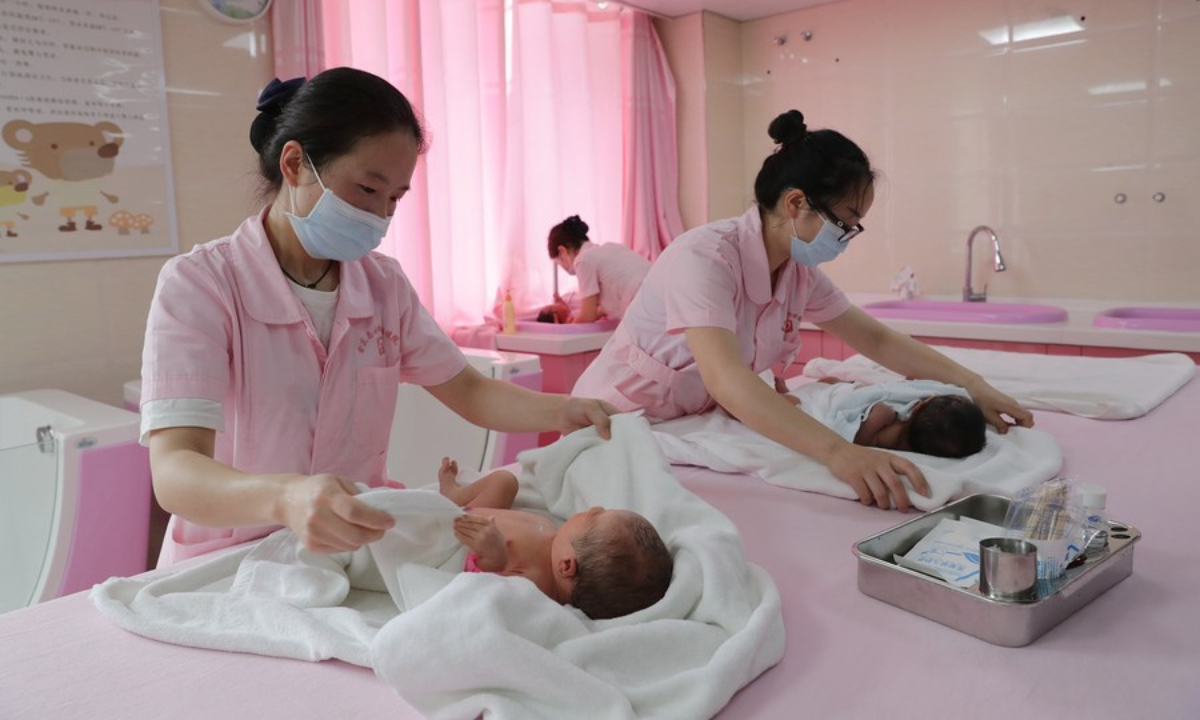
Nurses take care of newborn babies at a hospital in Zunyi, southwest China's Guizhou Province. Photo:Xinhua
China on Monday unveiled new birth support policy measures to promote the building of a birth-friendly society. An expert told the Global Times that these measures are comprehensive and could potentially improve China's current fertility rate, but additional efforts are still needed.
A directive from the General Office of China's State Council details 13 targeted measures on enhancing childbirth support services, expanding child-care systems, fostering a birth-friendly social atmosphere, and strengthening support in education, housing and employment, according to the Xinhua News Agency on Monday.
The directive includes a range of measures for birth support across four key areas, according to the directive. The first is to enhance support for fertility services by guiding eligible localities to include maternity insurance for flexible employment workers, migrant workers, and individuals in new forms of employment who participate in basic medical insurance.
Measures also include improving the maternity leave system to ensure the implementation of legally mandated leave periods, including maternity leave, paternity leave, and parental leave.
It also suggests establishing a maternity subsidy system and strengthen reproductive medical services by advising regions to include appropriate pain relief methods during childbirth and assisted reproductive technology projects within the scope of medical insurance reimbursement.
The second area focuses on strengthening the child-rearing service system, with measures including improving the quality of pediatric medical services and ensuring that eligible children's medications are promptly covered by medical insurance. It also involves increasing the supply of inclusive childcare services and improving supportive policies for inclusive childcare.
The third is to strengthen support measures in education, housing and employment, including supporting primary and secondary schools to actively carry out after-school services, and encouraging localities to introduce specific measures for families with multiple children attending the same school.
The measures also include strengthening housing support policies and encouraging eligible localities to increase support for families with multiple children when it comes to purchasing houses. It also encourages companies to allow employers to adopt flexible working hours and remote work arrangements based on actual conditions, creating a family-friendly work environment.
Besides these, measures involve actively promoting a new culture of marriage and childbirth, strongly advocating positive views on marriage, parenthood, and family. It also includes enhancing social awareness campaigns and strengthening education on national population conditions and policies by integrating relevant content into primary and secondary schools, as well as undergraduate programs.
He Yafu, an independent demographer, told the Global Times on Monday that the proposed measures are comprehensive and could potentially enhance China's current fertility rate. He pointed out that several local governments had introduced birth subsidy policies, but these subsidies are generally inadequate to raise the fertility rate. Therefore he emphasized the need for support from the central government, which has more financial resources to boost fertility rate.
Besides, China has recently officially launched
a fresh round of population and family development survey aimed at understanding family dynamics and reproductive behaviors, ultimately providing data to enhance fertility support policies.




